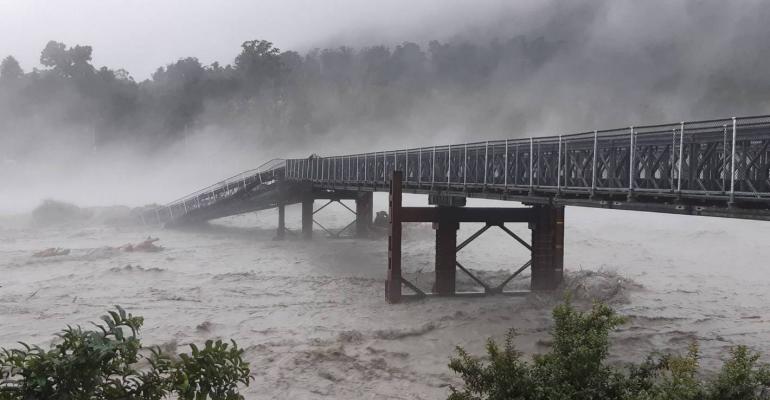- AUTHORAnita Wreford
- March 28, 2021
DSC Submission to the Climate Change Commission (2021)

The Deep South Challenge (DSC) welcomes the opportunity to make a submission on the Climate Change Commission’s (CCC) Draft Advice for Consultation. The DSC’s mission is to enable New Zealanders to anticipate, adapt, manage risk and thrive in a changing climate, and therefore our focus is on adaptation to climate change.
We would like to emphasise that adaptation needs to be considered alongside mitigation. Considering both together will help ensure that policy and investment decisions do not impede upon on Aotearoa’s ability to adapt to climate change and provide an opportunity for building resilience to climate change as we decarbonise the economy.
We note that the majority of the CCC’s advice is concerned with mitigation, but we welcome the limited recommendations around adaptation and would like to provide some further comments regarding these.
We strongly support the recommendation of avoiding “overshoot” in the emissions scenarios, as overshooting is expected to raise adaptation costs, and importantly make adaptation more challenging. We are unclear if the emission costs of adaptation have been considered in the emissions budget. While there are anticipated co-benefits, adaptation may also cause an initial increase in emissions e.g., from the construction of new infrastructure. Where this is the case it should be noted this requires further emission reductions from other sectors for the proposed budgets to be met.
Without effective mitigation in both Aotearoa and globally, adaptation becomes increasingly urgent, painful, and costly. DSC funded research starkly demonstrates the implications of high temperature increases across systems, communities and the economy. For example, $135 billion worth of buildings are potentially exposed to fluvial and pluvial flooding (Paulik et al. 2019). Thirty centimetres of sea level rise (foreseeable in the next 30 years) would expose $18.49 billion worth of buildings around New Zealand to coastal flooding, 2,000 km of roads, 112 km of railway tracks, 4,000 km of water pipelines, 1,600 km2 of agricultural land and 14 domestic / international airports would also be exposed (Paulik et al. 2020). This may lead to “insurance retreat”, where with a 1% probability of coastal inundation exposed homes in Wellington and Christchurch are expected to face a partial insurance retreat from 2030, with homes in similarly exposed locations in Auckland and Dunedin following only a few years later (Storey et al. 2020). Who bears this cost is yet to be decided.
Already, communities are struggling with their current exposure to extreme events such as flooding (e.g. Stephenson 2020). Other research demonstrates the inequalities already currently occurring in climate change adaptation (Ellis 2018). This threatens the notion of a “just transition”, exacerbates existing inequalities, and is only likely to increase as climate change affects more communities.
We support the enabling recommendation 2: To coordinate efforts to address climate change across Government, particularly a multi-agency appropriation which consolidates existing and future government funding for core climate change mitigation and adaptation activities. DSC research with local government and communities identified the need for centralised Government action on climate change (both adaptation and mitigation) (Barth and Vincent 2018). DSC research has identified the existence of “cascading impacts” of climate change that propagate throughout the economy and across sectors (Lawrence et al. 2020), which may be anticipated be reduced and/or better managed if there was a coordinated approach.
Similarly, we support Enabling Recommendation 4: Align legislation and policy to enable local government to make effective decisions for climate change mitigation and adaptation. DSC research has illustrated the contradictions and liabilities inherent in the current legislative environment, disempower local authorities from making effective long-term adaptation decisions (James et al. 2020.; Iorns Magallenes et al. 2019).
We note with respect to Necessary Action 4; Maximise the use of electricity as a low emissions fuel, that Aotearoa will need to become increasing dependent on renewable electricity. The DSC is supporting a research project examining the impact the climate change on the New Zealand energy system, as it is recognised that this is not well modelled across the range of IPCC future emission scenarios (led by Dr Jen Purdie, University of Otago). This project aims to model climate impacts on the entire energy system out to at least 2050, including climate projections; scenario changes to electricity demand from decarbonisation; and anticipated load changes from irrigation pumping, heating and air conditioning.
We emphasise the importance of considering adaptation in Necessary Action 10: To ensure that urban planning does not create greater exposure and vulnerability to infrastructure in future. DSC research highlights the ways that a changing climate and increasing severity and frequency of extremes will affect critical infrastructure (Hughes et al. 2019, 2020), including drinking water (Kamish et al. 2020).
DSC research (past and current) can provide insights into Necessary Action 11: Create options for alternative farming systems and practices. Completed projects include an analysis of capturing climate uncertainty in the construction of water storage for agricultural production (Wreford et al. under review), and an exploration of the suitability of land uses under climate change (Ausseil et al. 2019) – which is continuing in a second phase, co-funded with the Our Land and Water National Science Challenge. Other current projects include a transdisciplinary project examining the impacts of climate change, adaptation options, and the costs and timing of action in the dairy sector (led by Anita Wreford, Lincoln University), and a project developing adaptation planning and processes in the wine sector (led by Nick Cradock-Henry, Manaaki-Whenua Landcare Research).
In conclusion the Deep South Challenge is keen to continue collaborating with the Climate Change Commission. We invite you to look at our recently refreshed website and welcome the opportunity to discuss both the research outlined above and our wider portfolio of research.